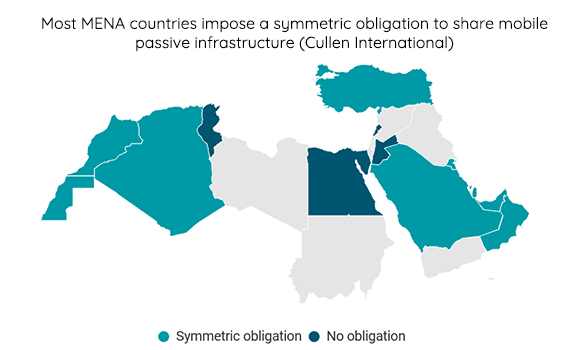Our new benchmark on mobile infrastructure sharing in the Middle East and North Africa region (MENA) sheds light on the main regulatory frameworks for sharing that have been adopted in 13 MENA countries.
The benchmark shows that nine MENA countries imposed a symmetric obligation on network operators to share their passive infrastructure (sites and masts).

Requirements for sharing active infrastructure, such as the radio access network (RAN), core network and national roaming, vary based on the type of sharing and on the conditions for sharing.
For example, RAN sharing is imposed as a symmetric obligation in the sparsely populated areas of Turkey and in the designated universal service areas in Saudi Arabia.
In Saudi Arabia, RAN sharing is allowed except where a sharing agreement would result in an aggregated market share of more than 65% in densely populated areas (more than 90,000 inhabitants).
In Algeria, RAN sharing is allowed only in 4G networks but prohibited for GSM and 3G networks. RAN sharing is not allowed at all in Morocco.
The benchmark also shows that spectrum sharing between mobile operators requires an approval in six MENA countries, is prohibited in three but not regulated in four.
For more information and to access the full benchmark, please click on “Access the full content” - or on “Request Access”, in case you are not subscribed to our MENA Telecoms service.
more news
11 February 26
Connected car services – when OEM connectivity triggers EU telecoms rules
Our new Explainer analyses connected car business models in relation to the EU’s EECC framework and the Open Internet Regulation, explaining how different models may be classified as internet access services, interpersonal communication services, and services consisting wholly or mainly in the conveyance of signals.
11 February 26
The DNA explained: more leeway for NRAs to impose symmetric access
Cullen International is issuing a series of analyses on different aspects of the Digital Networks Act (DNA) proposal. This report covers the symmetric access rules.
10 February 26
Global Trends in social media regulation
Our latest Global Trends benchmark analyses different aspects of social media regulation in key markets around the world.